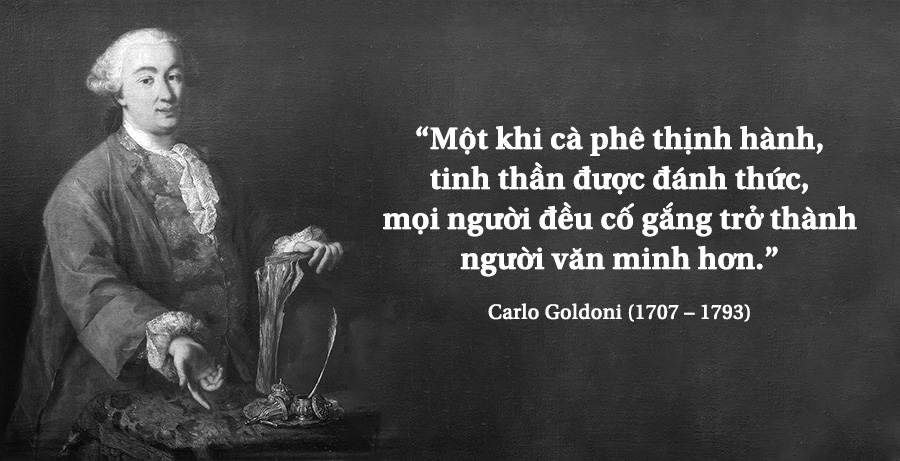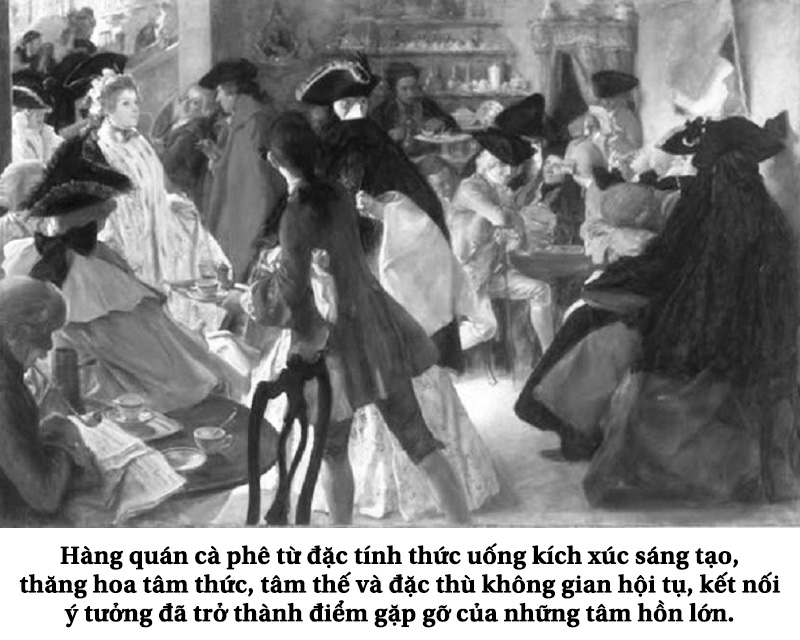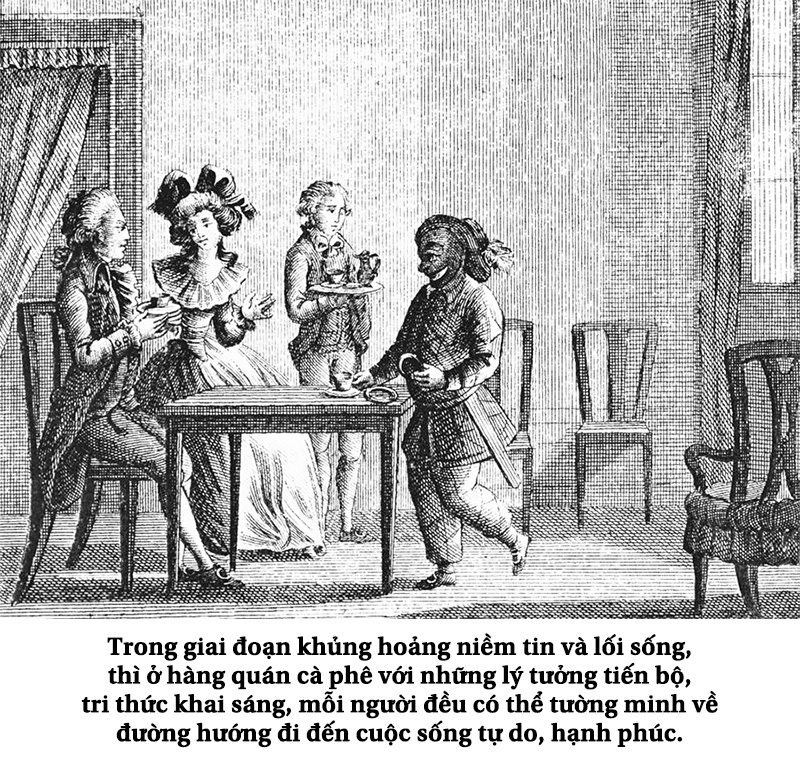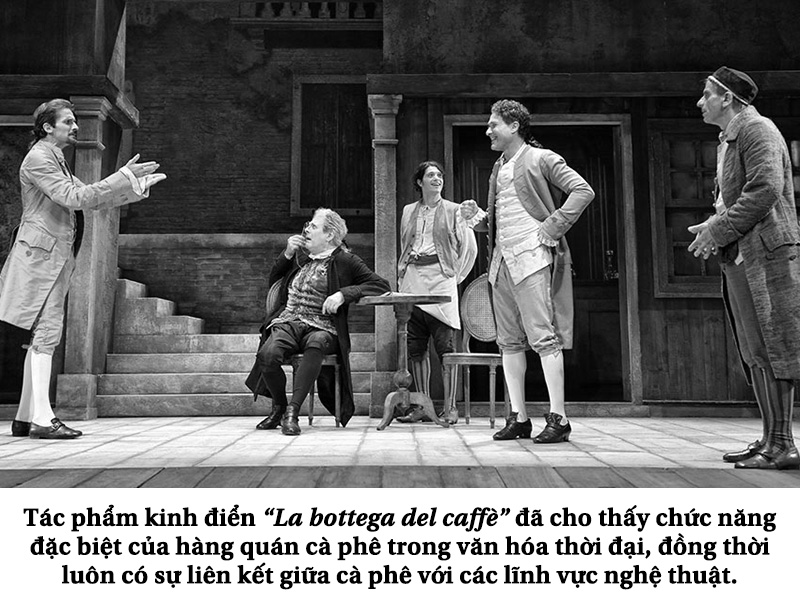Article 25: Philosopher Carlo Goldoni and the spirit of the times started in the cafe
Coffee and coffee shops play an essential role in disseminating progressive, humane knowledge, thoughts… transforming people’s minds and attitudes, so as to understand and master their own destiny.

“Once coffee is in vogue, the spirit is awakened, everyone is trying to become more civilized.” Carlo Goldoni (1707 – 1793)
An era that sought coffee as a new way of life
The 18th century in Europe is known as the “Century of Light” or the “Century of Reason”. The period when knowledge and creative spirit are displayed and emphasized as an awakening energy, bringing people to break away from imperfect ignorance to enlighten themselves and humanity. This is also a period of crisis of belief and crisis of lifestyle when the industrial revolution not only changes socio-economic conditions, science and technology but also gives rise to progressive ideas about individual freedom, national spirit.
Before that, human rights were severely restricted by feudalism and theocracy. People believed that the fate of each individual was determined by the class he belonged to. Political and legal institutions were controlled and manipulated by the aristocracy. Slave peasants were only the property of nobles, subject to absolute submission.
When the time came, people realized that wisdom was the light that lead people out of the dark reality, a new class of intellectuals was formed, tending to think creatively, dared to think, dared to take action, dared to accept the mission of spreading the truth to the masses in order to reinvigorate the destiny of each person.

The coffee shops, from the characteristics of the drink that stimulates creativity, sublimates the mind, the mood and the specific space of convergence and connection of ideas, have become the meeting point of great souls.
The intellectuals sought directions to find and share knowledge and the light of truth. Coffee shops from the characteristics of the drink that stimulates creativity, sublimates the mind, the mood and the specific space of convergence and connection of ideas, have become the meeting point of great souls, nurturing and starting great ideas. If England called the cafe a Penny University, France then called the cafe a Sidewalk Academy (Académie du Trottoir), Italy called the cafe a Free University (Liberissima Università). The special thing of coffee shops of this period compared to other public spaces was their reception regardless of social class, as long as you are willing to participate in intellectual discussions over a cup of coffee, then you are welcome. Furthermore, the cafe offered a large variety of newspapers and magazines as the only media center accessible to the public, creating a multidisciplinary academic environment. Philosopher Carlo Goldoni (1707 – 1793) was known as the great reformer of the Italian theater also honored the cafe as a symbol of the new era, a place to turn the world around, to awaken humanity.
Life changing platform in a coffee shop
In fact, social ideology and social existence always have a dialectical interaction. As an intellectual, Carlo Goldoni spent almost his entire life trying to transform contemporary dramatic art, instilling the ideas of freedom, progress, and life-mastery thinking into his work so that it would spread enlightening ideas to diverse audiences.
In 18th-century Italian society, La commedia dell’arte was a popular art form. A type of improvisational comedy without a script, without a director. Dialogues, dramatic actions were created naturally, right when performing in front of a crowd. Usually, each person performed a character personality, representing social class, implied by masks and characteristic costumes. The character personality from beginning to end was almost fixed.

In the period of crisis of belief and lifestyle, in cafes with progressive ideals and enlightened knowledge, everyone could clearly find the way to a free and happy life.
Carlo Goldoni researched and composed comedies with plot situations and characters representing an ideological attitude and psychological development. His works were built with scripts, organized characters like a miniature society. Carlo Goldoni therefore was considered a great reformer with comedies that spoke to people’s hearts, a desire to change lives and change the world.
In particular, Carlo Goldoni’s classic work “La bottega del caffè” (The coffee shop) highlights the role of coffee and coffee shops with the desire to change lives. The plot revolves around the events taking place at the cafe. A micro-society is built, in which actions and situations represent the real bad life. The conflicts and contradictions push to the climax and in the end, the barista – in the role of sage awakens the characters who are gradually going to the dark path, awakens the desire for happiness, freedom in everyone’s subconscious. The characters continue to struggle with their previous evil self to move towards a new person with good qualities and a satisfying and beautiful life.
In “La bottega del caffè”, Carlo Goldoni describes the barista as the personification of virtue and knowledge, representing the man of the new world. In that world, the light of truth will lead people to penetrate reality to rise to master their own destiny. All life changes take place in the coffee shop. According to many analysts, Carlo Goldoni conveys the implication of the power of coffee and cafes before the battle between ignorance and wisdom. In the period of crisis of belief and lifestyle, in cafes with progressive ideals and enlightened knowledge, everyone could clearly find the way to a free and happy life. And they found the opportunity, the way to change their destiny, change their life.

The classic work “La bottega del caffè” shows the special function of coffee shops in the culture of the times, and there is always the connection between coffee and arts.
The life-changing message was also conveyed by Carlo Goldoni in many works, through the character’s mental development, mood and actions. Even in the form of dramatic art reform, Carlo Goldoni strongly embodied a life-changing mindset. The mask was removed, the comedy character was no longer confined to an emotion, but actually transformed and developed his personality according to the dramatic situation. Those who are knowledgeable, creative and dare to take action would achieve the happiness they truly desire.
Carlo Goldoni was honored by the Italians as the author who brought dramatic art in Italy to its peak, the creator of a completely different genre of comedy. Creative content, humanistic dialogues. Carlo Goldoni’s comedy was always a re-enactment of the national mentality, each character has the role of expressing the wishes of the times, the aspirations of people’s life.
In another dimension, from Carlo Goldoni’s enthusiasm when writing works with the central stage being the coffee shop, it shows the special function of coffee shops in the culture of the times. At the same time, there is always a link between coffee and arts. In which, cafes and intellectuals talking over a cup of coffee have assumed the role of representing the aspiration towards living values, and humanistic ideals.
Coming up: Il Caffè – discourse of the enlightened intelligentsia


